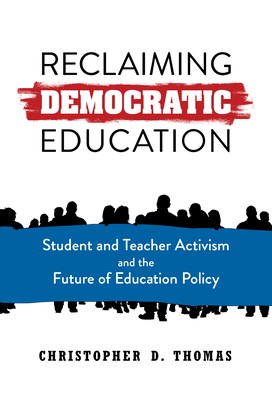
- We will send in 10–14 business days.
- Author: Christopher D Thomas
- Publisher: Teachers College Press
- ISBN-10: 0807766909
- ISBN-13: 9780807766903
- Format: 15.9 x 23 x 0.9 cm, minkšti viršeliai
- Language: English
- SAVE -10% with code: EXTRA
Reviews
Description
Since the spring of 2018, hundreds of thousands of students, teachers, and their allies have protested at or against their schools. These students and teachers have been protesting on a wide range of issues, from gun control and climate change to the underfunding of education and institutional responses to the COVID-19 pandemic. In Reclaiming Democratic Education, Chris Thomas examines how these activities exist at the intersection of two conflicting traditions--where student and teacher activism that aligns with the democratic purposes of public education collides with current policies that privilege the economic aims of education and restrict civic agency. By situating contemporary activism within these conflicting traditions, Thomas demonstrates how these activities constitute a rejection of the currently dominant policy paradigm in U.S. education. Thomas concludes with a discussion of how activism provides a foundation from which concerned teachers, school leaders, and policymakers can develop a new model for American education, one that reclaims an education for citizenship.
Book Features:
- Traces the interconnected histories of student and teacher activism, from the Revolutionary Period through the Common School Movement and the decade of protests in the 1960s to today.
- Demonstrates how education policy positions teachers as passive recipients of policy, who are often expected to sacrifice their own well-being for that of their students.
- Provides a roadmap for policy shifts that disrupt the currently dominant paradigm in American education and realize an Education for Citizenship paradigm.
EXTRA 10 % discount with code: EXTRA
The promotion ends in 21d.04:24:11
The discount code is valid when purchasing from 10 €. Discounts do not stack.
- Author: Christopher D Thomas
- Publisher: Teachers College Press
- ISBN-10: 0807766909
- ISBN-13: 9780807766903
- Format: 15.9 x 23 x 0.9 cm, minkšti viršeliai
- Language: English English
Since the spring of 2018, hundreds of thousands of students, teachers, and their allies have protested at or against their schools. These students and teachers have been protesting on a wide range of issues, from gun control and climate change to the underfunding of education and institutional responses to the COVID-19 pandemic. In Reclaiming Democratic Education, Chris Thomas examines how these activities exist at the intersection of two conflicting traditions--where student and teacher activism that aligns with the democratic purposes of public education collides with current policies that privilege the economic aims of education and restrict civic agency. By situating contemporary activism within these conflicting traditions, Thomas demonstrates how these activities constitute a rejection of the currently dominant policy paradigm in U.S. education. Thomas concludes with a discussion of how activism provides a foundation from which concerned teachers, school leaders, and policymakers can develop a new model for American education, one that reclaims an education for citizenship.
Book Features:
- Traces the interconnected histories of student and teacher activism, from the Revolutionary Period through the Common School Movement and the decade of protests in the 1960s to today.
- Demonstrates how education policy positions teachers as passive recipients of policy, who are often expected to sacrifice their own well-being for that of their students.
- Provides a roadmap for policy shifts that disrupt the currently dominant paradigm in American education and realize an Education for Citizenship paradigm.


Reviews